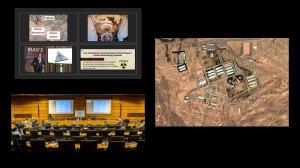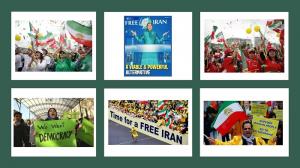(Video) Iran: Raisi’s Cabinet and a Need for an Assertive Policy Toward Regime
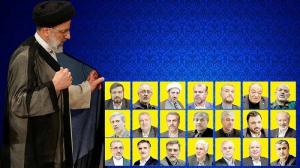
(PMOI / MEK Iran) and (NCRI): the Iranian regime’s president Ebrahim Raisi has handpicked a government of criminals and terrorists, including individuals who are under sanction by both US, the EU, and even the United Nations.

(PMOI / MEK Iran) and (NCRI): By appointing such figures as cabinet ministers and the heads of government agencies, Raisi conveys a commitment to repeating the same malign behaviors, with help from high-ranking issues who are well-practiced in those areas.

(PMOI / MEK Iran) and (NCRI): Int’l Community Must Hold Accountable Iranian Officials for Their Human Rights Crimes.

(PMOI / MEK Iran) and (NCRI): For many years, Hossein Amir-Abdollahian has been an aide to the criminal commander of terrorist Quds force, Qassem Soleimani, and the representative of the Quds Force within the ministry of foreign affairs.
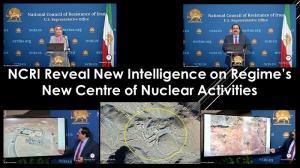
(PMOI / MEK Iran) and (NCRI): NCRI Reveal New Intelligence on Regime’s New Centre of Nuclear Activities.
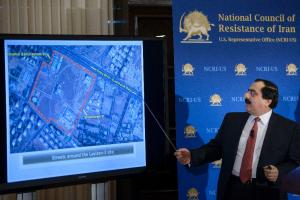
(PMOI / MEK Iran) and (NCRI): The NCRI disclosed details of secret underground nuclear research sites in Iran, known as Lavizan-3, at a press conference at the National Press Building in Washington, DC in February 2015.
The regime’s nuclear enrichment activities have come to include enrichment of uranium to 60% fissile purity just a short technical step away from weapons-grade.
By appointing such figures as cabinet ministers and the heads of government agencies, Raisi conveys a commitment to repeating the same malign behaviors, with help from high-ranking issues who are well-practiced in those areas.
Some members of Raisi’s administration were appointed despite having been sanctioned multiple times over the years, on account of their high-level involvement in multiple projects that pose a threat to international peace and stability, as well as the lives of the Iranian people themselves.
Mohammad Mokhber, who is now serving as Raisi’s first vice president, was sanctioned by the EU in 2010 for his role in the regime’s acquisition of material and know-how related to nuclear proliferation and the development of ballistic missile stockpiles. The following year, he was also sanctioned by the EU for human rights abuses he committed as head of Iran’s Prisons Organization.
In 2016, Mokhber was blacklisted by the US Treasury Department over the role he played in financing illicit projects by seizing the assets of political dissidents and members of ethnic and religious minorities. This describes the essential function of the institution known as Execution of Imam Khomeini’s Order, which Mokhber was placed in charge of in 2007.
According to the People’s Mojahedin Organization of Iran (PMOI/MEK), Mokhber’s leadership of the EIKO coincided with the transfer of billions of dollars in assets, mainly to projects being led by the regime’s Revolutionary Guards.
Sanctions targets aside, Raisi’s administration is comprised of an unprecedented number of IRGC officers, signifying a particular commitment to the regime’s malign policies and practices both at home and abroad, such as obtaining a nuclear weapon.
It is, therefore, no surprise that the sanctions looming over members of Raisi’s administration include sanctions for nuclear proliferation activities. Mokhber is one example, but another much more telling example is Mohammad Eslami, whom Raisi appointed to head the Atomic Energy Organization of Iran.
Eslami was involved in weaponization aspects of the regime’s nuclear program practically since its inception, has held meetings in the 1980s aimed at acquiring equipment and designs from Abdul Qadir Khan, the father of Pakistan’s nuclear weapons program.
As long ago as those early contributions were, Eslami’s involvement in Tehran’s nuclear project has evidently never ceased, and in 2008 the UN sanctioned him under resolution 1803 for “being engaged in, directly associated with or providing support for Iran’s proliferation-sensitive nuclear activities or for the development of nuclear weapon delivery systems.” At the time, Eslami was serving as head of Iran’s Defense Industries Training and Research Institute.
Today, he is tasked with overseeing all of the regime’s nuclear enrichment activities – activities that have come to include enrichment of uranium to 60 percent fissile purity, just a very short technical step away from weapons-grade.
Western powers and the entire international community should be deeply alarmed by this. For one thing, it allows Eslami to bring all of his prior experience with military technology to bear on the nuclear activities that Tehran has always dubiously insisted are civilian in nature. For another thing, it signals open defiance of the sanctions that should have seriously constrained Eslami’s political career, as well as the political careers of several persons who are now serving alongside him in the Raisi administration.
Such defiance underscores the fact that Western policies toward the mullahs’ regime have remained feckless and conciliatory for so long that Tehran now feels confident in its ability to escalate sanction-able activities while experiencing no real consequences. This sentiment is dangerous enough to global stability if the activities in question are limited to nuclear proliferation, missile development, and domestic human rights abuses. It is all the more dangerous if those activities also include foreign terrorism, which they very clearly do.
Apparently not content to defy international will just through the appointment of sanctioned officials to cabinet positions, Raisi has also included in his administration at least one individual who is subject to an international arrest warrant based on his past involvement in terrorist acts.
Ahmad Vahidi has been directly implicated in the bombing of an Israeli community center in Buenos Aires, Argentina, which killed 85 people in 1994. It is only one of many violent incidents in which he played a role as commander of the IRGC’s foreign special operations division, the Quds Force, around that time. And with so many other IRGC officers represented in Raisi’s cabinet, a number of them have been implicated in the same acts.
This would be a giant red flag for the international community under any circumstances. It is an even greater cause for alarm at the present historical moment when the Iranian regime is facing mounting threats from both at home and abroad and is poised to lash out in the most desperate fashion to counter those threats.
Already, Tehran has conducted its worst single crackdown on dissent in recent years, having killed 1,500 peaceful protesters and arrested thousands of others in the midst of a nationwide uprising in late 2019, when Ebrahim Raisi was head of the judiciary. And in response to a previous uprising at the beginning of 2018, the regime orchestrated a bomb plot targeting the Iranian Resistance’s, the National Council of Resistance of Iran (NCRI), gathering outside of Paris.
The 2018 terror plot was thwarted and eventually led to prison terms for the regime’s diplomat-terrorist, Assadollah Assadi, and his three co-conspirators. But both the foreign and the domestic attacks on organized activist groups hearkened back to a prior era of unrestrained political violence, during which 30,000 political prisoners were killed in the space of about three months in 1988. That massacre also heavily featured Raisi’s handiwork, as he was one of four officials sitting on the Tehran “death commission” that oversaw executions in Evin and Gohardasht Prisons.
It is no wonder that such a figure would handpick such a government that its ministers are under sanctions by the international community over various actions that demonstrate the same underlying impulse to safeguard and expand the regime’s power regardless of cost or consequences. The only way Raisi and his government will ever deny that impulse is if the cost and consequences imposed on it by the international community are serious enough to undermine the regime’s longstanding sense of impunity.
Shahin Gobadi
NCRI
+33 6 51 65 32 31
email us here
Visit us on social media:
Facebook
Twitter
Iran: Ebrahim Raisi’s cabinet of thieves and terrorists gets approval from parliament
Legal Disclaimer:
EIN Presswire provides this news content "as is" without warranty of any kind. We do not accept any responsibility or liability for the accuracy, content, images, videos, licenses, completeness, legality, or reliability of the information contained in this article. If you have any complaints or copyright issues related to this article, kindly contact the author above.

